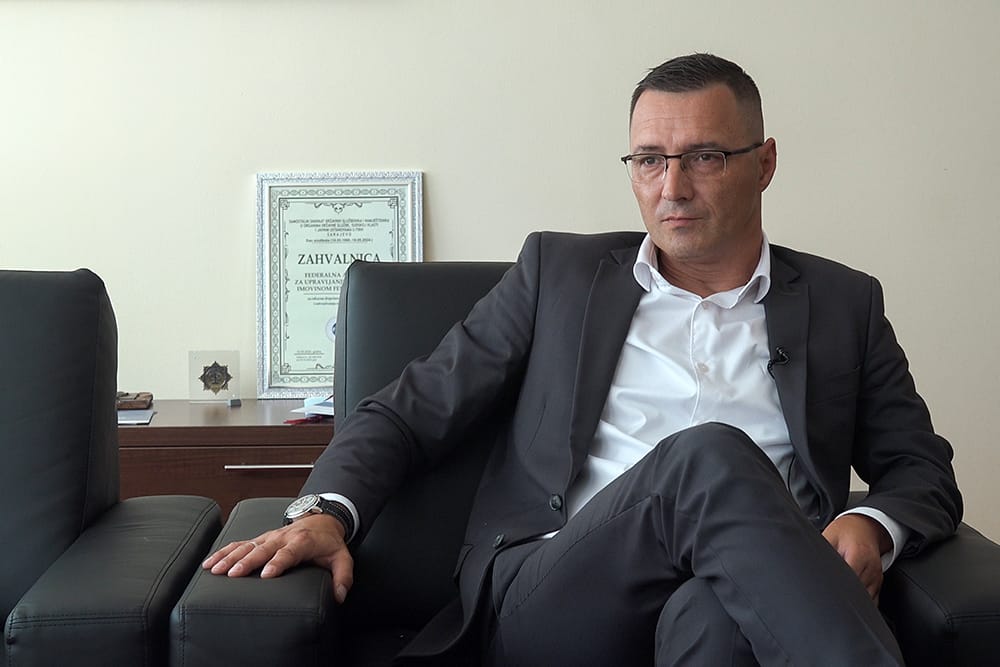Family members have sued Kemal Čaušević, the former director of the Indirect Taxation Authority of Bosnia and Herzegovina (ITA BiH), seeking to be registered as co-owners of eight properties seized by the BiH Court.
Čaušević’s wife, Aida Čaušević, his mother, Džemila Čaušević, and his sister, Envera Ramić, filed the lawsuit a month after he was sentenced in May 2023 to five and a half years in prison for accepting bribes. Čaušević was ordered to return 1.72 million BAM in illicit gains.
He was required to pay this amount within 30 days of the verdict but failed to do so, leading the BiH Court to initiate forced collection proceedings.
The former director of ITA BiH was convicted for granting preferential status to textile import companies. In the same ruling, Čaušević was acquitted of money laundering charges, specifically the allegation that he used bribe money to purchase eight apartments, commercial properties, and three plots of land totaling 20,400 square meters in prime locations in Sarajevo.
Legal disputes initiated by Čaušević’s family members could hinder the state’s efforts to recover the illicitly acquired assets. Additionally, the lack of national laws and institutions for asset forfeiture works in the favor of the Čaušević family.
In the lawsuit, Čaušević’s wife is claiming a share of seven properties acquired during their marriage, while his mother and sister are seeking an apartment he inherited from his late father in 2011. Although they had previously renounced their claims during the inheritance process, they now want to reclaim them.
“These are so-called measures to obstruct enforcement, creating a fictitious burden,” said Eldan Mujanović, a professor at the Faculty of Criminalistics at the University of Sarajevo, who helped draft the Law on the Forfeiture of Illegally Acquired Property in the Federation of BiH (FBiH).
However, state prosecutor Dubravko Čampara, who represented the prosecution against Čaušević, believes that private lawsuits cannot prevent the state from recovering the assets.
“The state has priority in collecting these assets, so it’s unlikely that his wife will be able to block this,” he said.

The Battle for Million-dollar Properties
Čaušević was convicted for accepting at least 1,722,000 BAM from Anes Sadiković and Sedinet Karić over a period of four years to favor their companies, as textile importers, through his position and decisions at ITA BiH, to the detriment of other importers.
In the same ruling, the BiH Court acquitted him of charges that he used bribe money to purchase properties. In the rationale, the Court found that the link between the illicit funds and the properties was insufficiently established.
Expert reports indicated that Čaušević, along with his wife and child, had 1.96 million BAM during this period, enabling them to purchase real estate.
Kemal and Aida Čaušević married in February 2004, three months after he was appointed director of ITA BiH At that time, he did not own any apartments, houses, or other properties. Between 2006 and his departure from the director’s role in 2011, he acquired 12 properties and inherited one from his father.
A month after the BiH Court’s final conviction of Kemal Čaušević in May 2023, his wife filed a lawsuit with the Municipal Court in Sarajevo to determine and divide their marital assets.
The lawsuit involves apartments of 108, 58, and 72 square meters, as well as a commercial space of 15.83 square meters, located at the entrance to Stakleni Grad, a small craft center near the Sarajevo Cathedral. Additionally, Aida Čaušević is seeking co-ownership of two more apartments, each 67 square meters, on Ferhadija Street, and a 5,000-square-meter plot in the Sarajevo neighborhood of Poljine, known for its properties owned by local politicians and businessmen.
In her lawsuit, she asserts that although these properties are officially registered in her husband’s name, they are actually joint assets acquired through their work during the marriage. She further claims that the plot in Poljine and the commercial space in Stakleni Grad were purchased with funds from Kemal’s father and their minor child.

At the same time, Čaušević’s mother and sister, Džemila Čaušević and Envera Ramić, have filed a lawsuit seeking co-ownership of a 51-square-meter apartment inherited from their late father, Esad. In mid-2011, the Municipal Court in Sarajevo determined that the legal heir to the deceased’s estate was Kemal, as the two women had previously renounced their claims.
However, 13 years later, Čaušević and Ramić are now seeking to “invalidate their renunciations of inheritance, claiming they were made under deception or mistaken belief”, although they have not specified the nature of the deception. They are requesting that the court reconsider the division of the property.
Additionally, a nearly 200-square-meter commercial space in the Shopping Center on Grbavica has also been blocked by the Court’s decision. Although the property was acquired during the marriage, his wife did not claim any rights to it.
Aida Čaušević has not responded to calls and messages from CIN journalists. Envera Ramić declined to speak to journalists.
Suad Sultanić, Čaušević’s lawyer, says that he is not aware of the family’s lawsuits. When asked when and how Čaušević plans to return the 1.72 million BAM, he replied, “Where is that money?
I have not found any evidence in either the prosecution or court files that anyone gave him that money, except for a witness statement who could neither have had the money nor proved that he did”, Sultanić told CIN journalists.
He has filed an appeal with the Constitutional Court of BiH, aiming to overturn the verdict against Čaušević.
The BiH Court has initiated forced collection by sending the necessary documentation to the Administrative Department for processing.
Under the BiH Enforcement Act, the court will attempt to recover the illicitly acquired assets through bank accounts or movable property. Real estate can also be subject to enforcement. However, if the property has multiple owners in addition to the debtor, the court can seize it, but co-owners will either have the right of first refusal or will be compensated for their share after the sale. Additionally, the debtor can use rental income or lease payments from the properties to satisfy court claims.
“The state will sell the property, keep the proceeds, and deposit any surplus into an account. The state will then await the resolution of the lawsuits from his wife and distribute the remaining funds accordingly,” said Čampara.
According to real estate agencies, the current market value of the five apartments, the commercial space in Stakleni grad, the property on Ferhadija Street, and the land in Poljine — over which Aida Čaušević is seeking co-ownership in the land registry — is approximately 2.5 million BAM. Her husband, Kemal Čaušević, paid around 630,000 BAM for these properties between 2006 and 2011.
Questionable Asset Recovery
Unlike the entities and Brčko District, which have asset recovery agencies, there are no such laws or institutions at the national level in Bosnia and Herzegovina.
Emir Bašić, Acting Director of the Federation Agency for the Management of Seized Assets, believes that illegally acquired property in BiH can easily remain with convicted individuals despite court rulings.
“A skilled lawyer can find loopholes in our laws to prevent the state from recovering these assets”, Bašić said.
He added that the Agency at the Federation level already faces similar challenges in enforcing final judgments and has observed mechanisms that undermine the state’s efforts.
“… that there is no cash reserve against which the assets can be recovered, or that certain properties may have already been sold, and there is no specific lien to protect them until we can execute on those assets,” Bašić explained.

Sarajevo-based lawyer Mirza Ališah believes there has been a lapse in the Čaušević case.
“The state should not allow assets acquired through criminal activity to be transferred or encumbered in any way (…) or for the convicted individual to transfer assets to third parties, family, friends, and so on, thus losing track of the true owner”, Ališah stated.
Professor Eldan Mujanović agrees that the lack of national-level laws and agencies is the biggest problem.
He believes that the lawyers representing Čaušević’s family have provided effective guidance to hinder the enforcement process. “Honestly, I think they won’t succeed; it will only make things a bit more complicated and delayed”, Mujanović explained, noting that, according to the law, the state should always be first in line for recovery.









